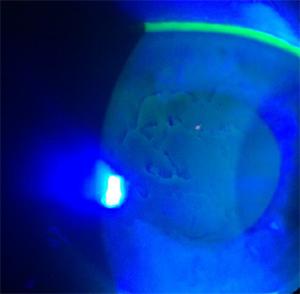Recurrent Corneal Erosion
Recurrent corneal erosion information sheet
The cornea is the clear front windshield of the eye. Erosions occur when the top skin layer of the cornea tear, typically at night-time or when you wake from sleep. These tears or erosions result in severe pain, watering and sometimes blurred vision.
What causes recurrent erosion?
Recurrent corneal erosions can occur as a result of trauma, severe dry eye or a genetic condition called Epithelial Basement Membrane Dystrophy (EBMD). All these conditions can lead to poor adhesion between the top skin layer of the cornea and the anchoring layer below it. The poor adhesions mean that the skin layer easily tears.
How is it diagnosed?
Typically, a story of pain at night-time or upon waking up is the main clue to the diagnosis. Often your optometrist or ophthalmologist can see the outline of the erosions on slit lamp microscope examination.

Outline of old erosion on the front surface of the cornea seen with a microscope.
How is recurrent erosion treated?
There are many different treatments available, but none have a 100% success rate. Treatments include hypertonic saline or salty teardrops, topical steroid drops, bandage contact lenses, oral antibiotics, and serum tear drops and laser surgery. Usually laser surgery is reserved for when conservative treatments fail.
Laser surgery or phototherapeutic keratectomy (PTK) uses the same excimer laser, which is used for laser vision correction. The abnormal unhealthy skin layer is first removed with a weak alcohol solution and then a light laser applied to the under surface. This promotes adhesion. A bandage contact lens is left on the eye for 4 days to allow a new healthy skin layer to grow.
PTK has a good success rate but like all surgeries has risks. Your surgeon will discuss these with you.







